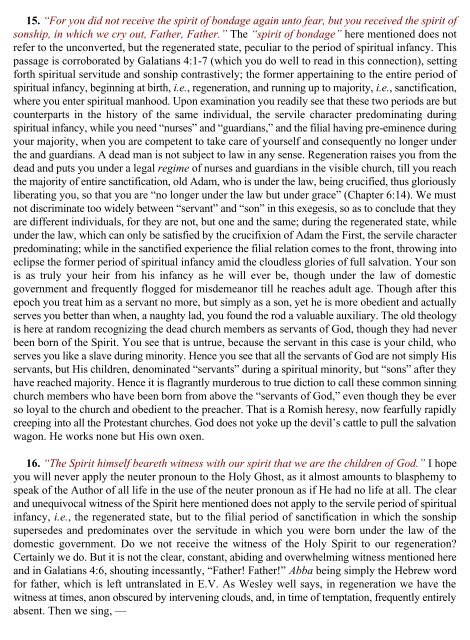Godbey's Commentary - Acts - Romans - Enter His Rest
Godbey's Commentary - Acts - Romans - Enter His Rest
Godbey's Commentary - Acts - Romans - Enter His Rest
You also want an ePaper? Increase the reach of your titles
YUMPU automatically turns print PDFs into web optimized ePapers that Google loves.
15. “For you did not receive the spirit of bondage again unto fear, but you received the spirit of<br />
sonship, in which we cry out, Father, Father.” The “spirit of bondage” here mentioned does not<br />
refer to the unconverted, but the regenerated state, peculiar to the period of spiritual infancy. This<br />
passage is corroborated by Galatians 4:1-7 (which you do well to read in this connection), setting<br />
forth spiritual servitude and sonship contrastively; the former appertaining to the entire period of<br />
spiritual infancy, beginning at birth, i.e., regeneration, and running up to majority, i.e., sanctification,<br />
where you enter spiritual manhood. Upon examination you readily see that these two periods are but<br />
counterparts in the history of the same individual, the servile character predominating during<br />
spiritual infancy, while you need “nurses” and “guardians,” and the filial having pre-eminence during<br />
your majority, when you are competent to take care of yourself and consequently no longer under<br />
the and guardians. A dead man is not subject to law in any sense. Regeneration raises you from the<br />
dead and puts you under a legal regime of nurses and guardians in the visible church, till you reach<br />
the majority of entire sanctification, old Adam, who is under the law, being crucified, thus gloriously<br />
liberating you, so that you are “no longer under the law but under grace” (Chapter 6:14). We must<br />
not discriminate too widely between “servant” and “son” in this exegesis, so as to conclude that they<br />
are different individuals, for they are not, but one and the same; during the regenerated state, while<br />
under the law, which can only be satisfied by the crucifixion of Adam the First, the servile character<br />
predominating; while in the sanctified experience the filial relation comes to the front, throwing into<br />
eclipse the former period of spiritual infancy amid the cloudless glories of full salvation. Your son<br />
is as truly your heir from his infancy as he will ever be, though under the law of domestic<br />
government and frequently flogged for misdemeanor till he reaches adult age. Though after this<br />
epoch you treat him as a servant no more, but simply as a son, yet he is more obedient and actually<br />
serves you better than when, a naughty lad, you found the rod a valuable auxiliary. The old theology<br />
is here at random recognizing the dead church members as servants of God, though they had never<br />
been born of the Spirit. You see that is untrue, because the servant in this case is your child, who<br />
serves you like a slave during minority. Hence you see that all the servants of God are not simply <strong>His</strong><br />
servants, but <strong>His</strong> children, denominated “servants” during a spiritual minority, but “sons” after they<br />
have reached majority. Hence it is flagrantly murderous to true diction to call these common sinning<br />
church members who have been born from above the “servants of God,” even though they be ever<br />
so loyal to the church and obedient to the preacher. That is a Romish heresy, now fearfully rapidly<br />
creeping into all the Protestant churches. God does not yoke up the devil’s cattle to pull the salvation<br />
wagon. He works none but <strong>His</strong> own oxen.<br />
16. “The Spirit himself beareth witness with our spirit that we are the children of God.” I hope<br />
you will never apply the neuter pronoun to the Holy Ghost, as it almost amounts to blasphemy to<br />
speak of the Author of all life in the use of the neuter pronoun as if He had no life at all. The clear<br />
and unequivocal witness of the Spirit here mentioned does not apply to the servile period of spiritual<br />
infancy, i.e., the regenerated state, but to the filial period of sanctification in which the sonship<br />
supersedes and predominates over the servitude in which you were born under the law of the<br />
domestic government. Do we not receive the witness of the Holy Spirit to our regeneration?<br />
Certainly we do. But it is not the clear, constant, abiding and overwhelming witness mentioned here<br />
and in Galatians 4:6, shouting incessantly, “Father! Father!” Abba being simply the Hebrew word<br />
for father, which is left untranslated in E.V. As Wesley well says, in regeneration we have the<br />
witness at times, anon obscured by intervening clouds, and, in time of temptation, frequently entirely<br />
absent. Then we sing, —
















